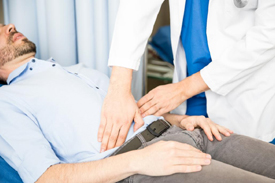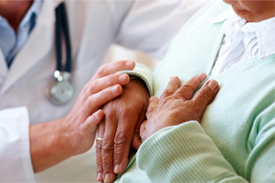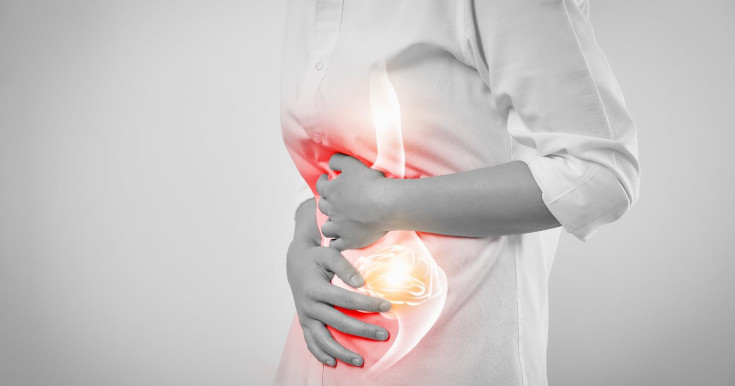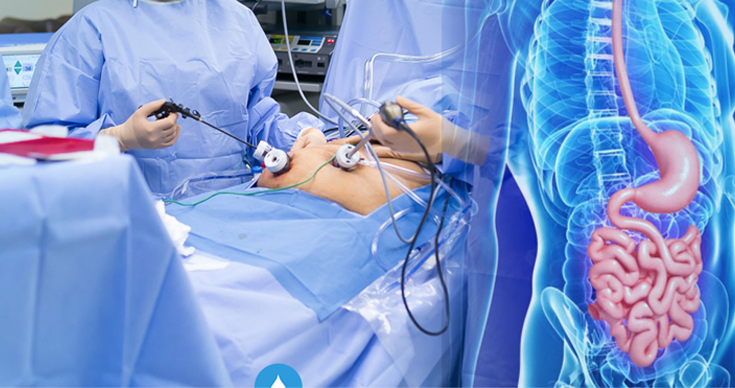Viral Gastroenteritis – Can It Risk Your Life?
Intestinal infections have certain signs and symptoms, such as stomach pain, nausea, vomiting, fever, etc. Viral gastroenteritis is a type of intestinal infection that is also commonly known as stomach flu.
It generally occurs if a healthy person comes in contact with an infected person or while consuming contaminated food or water. People with a strong immune system tend to get less affected by viral gastroenteritis and are more likely to recover without complications.
However, there is no proper treatment for viral gastroenteritis. If you get affected, the only way to prevent it is to follow certain restrictions and precautions. So, consult with the top gastroenterologist hospital in Kolkata.
Symptoms of viral gastroenteritis
Often people get confused between stomach flu and influenza. But, both are completely different medical conditions. In the case of flu, your respiratory system gets affected, which includes the lungs, throat, and nose.
However, in the case of gastroenteritis, your GI tract gets infected, which also includes your intestine.
The symptoms that indicate you are affected by Viral gastroenteritis are:
- Non-bloody but watery diarrhea in the preliminary stage
- Vomiting and nausea
- Stomach cramp or excessive stomach pain
- Muscle ache and headache
- Low-grade fever
- In extreme conditions, if the infection gets severe, it can lead to bloody diarrhea.
After getting infected, usually, viral gastroenteritis symptoms appear within 2 to 3 days. It can range from mild to severe symptoms, lasting for 3 to 4 days. Depending on the condition of the body, it can also exceed more than 15 days
Read Also: Peptic Ulcer: Types, Causes, Symptoms, Diagnosis And Treatment
The symptoms of viral stomach infection and bacterial diarrhea are quite similar but do not get confused between them. Get a proper diagnosis before the treatment to understand the root cause of the disease.
Cause of Viral gastroenteritis
When you drink contaminated water or eat virus-borne food, you will most likely get Viral gastroenteritis. Even sharing the same towels or utensils with an affected person can lead to this condition.
Viruses that cause gastroenteritis are:
- Norovirus mainly affects children and also adults. These are generally food-borne and can affect families and communities in one go. If people are living in confined spaces, then Norovirus has a chance of spreading much more quickly. Even touching surfaces contaminated with Norovirus and then putting your hand in your mouth can lead to viral gastroenteritis.
- Another common cause of viral gastroenteritis is rotavirus. This primarily affects children. Moreover, this virus spreads through objects. If you touch any contaminated object or food, the infection can spread severely among infants and young children. There are no symptoms seen among adults when affected by Rotavirus. However, it can spread illness easily to a healthy person from a person who is unknowingly carrying the virus.
Other than this, eating raw or uncooked seafood or shellfish can lead to viral gastroenteritis.
What are the complications that are generated due to viral gastroenteritis?
The most common complication is dehydration, where the body loses essential salts and minerals through water loss. Dehydration and vomiting also lead to the removal of fluids from the body.
If the body starts to lose a huge amount of fluid, it needs to be replaced, so hospitalization is a must. IV is the only way through which one can recover lost fluid content. Otherwise, dehydration can lead to severe consequences.
Who is at risk of getting affected?
- People of all ages have the chance of getting affected by viral gastroenteritis. However, the more susceptible to gastroenteritis are young children. They become vulnerable while going to a child care center or elementary school because, at this time, they are at the immunity-building stage.
- Older adults with weak immune systems tend to get affected easily. They carry the germs as well as pass on the germs, too. So, one must go through regular follow-ups at a top gastroenterologist hospital in Kolkata.
- People who have weak immune systems also get affected easily. If somebody’s resistance to infection has decreased, such as HIV or AIDS patients, people undergoing chemotherapy, or having an auto-immune disease, then they are at risk of getting affected by the gastroenterologist.
Viral gastroenteritis tends to get active based on seasons. So, you need to maintain precautions during situations where they can spread easily to avoid any kind of complications.
When should you see the doctor?
If you are an adult and have been affected by any of the symptoms listed above, then you must immediately get a thorough check-up. Book an appointment at the top gastroenterologist hospital in Kolkata.
For adults:
Here are the conditions based on which you must immediately consult with a healthcare provider:
- If fluid loss continues for more than 24 hours.
- If you have been continuously vomiting for more than 2 days.
- In case you find stains of blood in your vomit.
- If you have dehydration symptoms that include excessive thirst, yellow urine or no urine, dry mouth, lightheadedness, and severe weakness.
If you find blood in your ball movements, severe stomach pain that fails to get cured, or fever above 104 Fahrenheit, then you must go to a doctor. Otherwise, it can lead to life-threatening conditions.
For infants and children:
In the case of infants, you have to monitor the child very carefully. Here are the symptoms based on which you must immediately consult with the top gastroenterologist hospital in Kolkata.
- If there are signs of stains or blood, along with diarrhea
- The child is having 102 Fahrenheit fever
- The child seems irritated or tired.
- If the child is going through excessive discount or stomach pain.
Check if the child has become dehydrated and still not drinking water. However, there is excessive thirst, restlessness, dry mouth, urinating, frequent vomiting, etc. Also, check the diaper, whether it has become wet in 6 hours. Other than this, blood in stool, drowsiness, and non-responsiveness symptoms require immediate medical attention.
Precautions and preventions
- Vaccination: In many countries, gastroenteritis, caused due to rotavirus, can be prevented through vaccination. Vaccination will protect the body from risk and also from turning the symptoms into severe conditions.
- Proper hygiene: It is important to wash your hands regularly and mostly after you use the toilet and while changing the diapers. Always maintain proper sanitization and wash your hands before preparing or eating food. It is best to use warm water and soap and rub your hand for at least 15 to 20 seconds. You can also use sanitary wipes or hand sanitizer from time to time.
- Use personal items: You must avoid sharing utensils, that include glasses and plates. Also, maintain a separate towel for the bathroom and try not to share clothes.
- Avoid close contact if somebody is affected by an intestinal infection. You must maintain a proper distance to avoid getting infected.
- Clean hard surfaces: It is advised to keep your home hygienic by disinfecting hard surfaces, such as counters. You can prepare a homemade mixture for proper cleaning.
- Do the laundry daily: Viral gastroenteritis spreads through the laundry. Thus, it is important to wash dirty clothes daily, including bedding. Try to use hot water and dry them properly.
Conclusion
When you have Viral gastroenteritis, it is important to drink fruit and broth, or you can also try sports drinks. This will help to replace the lost fluids and electrolytes that have been drained from your body.
You can also talk to your doctor and consult about the solutions you can provide to an infant who is still feeding on breast milk. Medicines are also suggested to cure viral gastroenteritis, so ditch over-the-counter medicines and get proper treatment from a doctor. Over-the-counter medicines can lead to increased risk among infants and children.
Usually, doctors prescribe probiotics to treat Viral gastroenteritis, as antibiotics won’t work in this case. Talk to a doctor at ILS Hospitals and get alternative or complementary medicines to help you get cured immediately.
Endoscopy: What To Know
Gastroenterologists often suggest patients who suffer from gastric or acid reflux issues go for endoscopy. Mainly with the help of endoscopy, it is easy to determine the condition of your intestine, stomach, colon, and other related digestive organs.
Doctors perform various endoscopy methods to understand the issues of the digestive system. Before you prepare yourself for endoscopy in Kolkata, there are a few things that you should know.
What is Endoscopy?
A long thin tube is placed in the orifice (either mouth or anus) to examine the body organs properly. This tube is known as an endoscope. It will help the doctor to view the organs and understand the cause of the digestive issues properly.
In the case of colonoscopy, this tube or endoscope is inserted inside the rectum. With this procedure, the physicians can check the intestine and colon condition of your body. With enteroscopy, the doctors can detect the problems in the oesophagus, throat, and upper intestine.
Facts of Endoscopy
A few interesting endoscopy facts are discussed below;
- All types of endoscopic procedures are safe, reliable, and quick.
- The main aim of performing endoscopy is to get an accurate investigation of the stomach and perform further treatment accordingly.
- Remove polyps or tumours from your digestive areas; an endoscopy is effective.
- The first tube or endoscope was discovered in 1806.
Preparation For Endoscopy
To investigate various digestive organs accurately, you can rely on endoscopy in Kolkata. For endoscopy, you do not have to stay hospitalized even for a day. It takes around 1 hour to complete the entire endoscopy.
You may have to fast for 12 hours before the endoscopy. Consult your doctor.
You will be advised to take laxatives before the night of endoscopy for clearing the body system.
Process Of Endoscopy
To perform an endoscopy, there are certain health reasons as follows;
- Investigate
If any patient is experiencing breathing issues, abdominal pain or disorder, vomiting, painful ulcers in the stomach, difficulty swallowing, or bleeding from gastric organs, then the doctor uses an endoscope to understand the cause of these symptoms.
- Confirmation
Once endoscopy is done on the patient, a biopsy is carried on to confirm cancer or not. According to the confirmation of this diagnosis, further, the doctor will suggest medication and carry on the treatment.
- Treatment Purpose
Often doctors use an endoscope for removing ulcers or polyps from the digestive organs smoothly. Hence an illness can be treated successfully and directly by the endoscopy method.
- During Surgery
In recent times, doctors have preferred advanced endoscopic tools during surgery. It helps to make the surgery easier and less painful. Surgeries like gallstone removal, fallopian tube tying, or removal of any sized tumours from lungs or digestive system require endoscopy sometimes.
Again, laparoscopy is the latest method of endoscopy. Therefore for surgeries like gallstone operations, keyhole surgery is performed to remove the stones from the bladder. It saves time and is safe for patients.
Side Effects Or Risks Of Endoscopy
As a whole, endoscopy is a reliable and safe process for patients. However, there are certain risk factors associated with it. They are as follows;
- Bloating
- Abdominal Cramps
- Throat numbness for some time due to anaesthesia
- Continuous pain in the place of endoscopy
- Minor bleeding internally
Conclusion
A doctor who does endoscopy in Kolkata observes the patient for 24 hours after the treatment. If you notice any symptoms like chest pain, blood vomit, or breathing trouble after endoscopy, immediately report to the doctor.
The recovery after endoscopy depends on which method is used on the patient for the same. In general, within an hour, after the anaesthesia wears off, patients feel better. For the most qualified endoscopy in Kolkata, you should visit https://www.ilshospitals.com/.
Common Gastrointestinal Symptoms in COVID-19
Digestive system disorders may not be the first thing that comes to your mind when you think about COVID-19 symptoms. But, according to scientific data, about 53% of all patients hospitalised due to the disease have experienced at least a single gastrointestinal problem.
According to doctors at a top gastroenterologist hospital in Kolkata, the incidence of GI disorders is rising among COVID-19 patients. If a person has pre-existing gastric problems, they are at an increased risk for more serious complications.
The evidence dates back to the time when COVID-19 was first discovered. The first patient of the horrendous illness had suffered from nausea for two days and ultimately advanced to diarrhoea. Symptoms related to the gastrointestinal system have made it to the list of the most common symptoms of COVID-19.
Symptoms Of Gastrointestinal Disorders in COVID-19

The main symptoms related to the gastrointestinal system include:
- Absence of taste or smell
- Reduced appetite
- Diarrhoea
- Gastrointestinal bleeding
- Nausea
- Vomiting
Some of the less common symptoms are:
- Acid reflux
- Abdominal pain
- Inflammation of the intestinal tract
- Indigestion
According to a top gastroenterologist hospital in Kolkata, in most people, these symptoms accompany respiratory disorders, which is the hallmark of COVID-19.
How is COVID-19 Causing Gastrointestinal Problems?
Coronavirus can affect numerous parts of the body, suggests recent research. This virus particularly affects the cells of the intestine and the respiratory cells using a special protein called ACE-2, a receptor protein. The cell membrane has these proteins that assist in controlling blood pressure. After entering the cell, the virus starts reproducing using the human cellular machinery.
Several viral progenies are released after the cell breaks open, and the immune system produces a strong response against these cells and causes an inflammatory reaction. This inflammatory reaction is ultimately responsible for gastrointestinal symptoms.
The viruses can also cause damage to the gastrointestinal tissues, which can produce intense symptoms like nausea, abdominal pain and diarrhoea. The virus may also cause the vagus nerve to act up causing nausea.
Why Does It Matter?
Many studies suggest that gastrointestinal symptoms of COVID-19 are one of the first symptoms to show up in the patients. This, tracking GI symptom can help in predicting the presence of the disease early on. Moreover, it has been observed in many research studies that people with more severe cases of GI infections are more likely to develop severe complications from COVID-19.
Some scientists have come up with a hypothesis to explain the phenomenon. According to this, people taking medications used to treat many stomachs and intestinal problems like those that reduce the amount of acid in the stomach make the patients more susceptible to the infection. That is because the virus usually gets killed due to the stomach acid, and people taking the medications have a lower amount of acid.
The gastrointestinal system should be monitored well in all COVID-19 patients for a better treatment outcome, says a doctor at a top gastroenterologist hospital in Kolkata. More research must be done to formulate a proper treatment plan for gastrointestinal symptoms in coronavirus patients. https://www.ilshospitals.com/ is one of the top gastroenterologist hospitals in Kolkata, where you can visit this pandemic for any assistance.
Keeping Your Digestive Distress in Check
Gastrointestinal or Digestive Distress is caused, due to a variety of reasons, such as stomach flu, food poisoning, parasite infections, or cancer. The major symptom of digestive distress is food which includes caffeine, alcohol, carbonated beverages, fried food, or high-fat food. Typical symptoms of gastrointestinal distress may include abdominal pain, gas, cramps, heartburn, diarrhea, constipation, weight gain or loss, and fatigue. If you suffer from constant stomach problems and digestive issues, you might have digestive / gastrointestinal distress.
Digestive distress is usually caused by unhygienic food, stress, being physically inactive, intake of large amounts of dairy products, stomach infections, or a low fibrous diet.
What is the treatment?
When it comes to treatment, one size doesn’t fill all. So, we combine various treatment options in creating a personalized treatment approach.

- Healthy diet – A healthy diet keeps your immune system strong and prevents other diseases too. A healthy diet should include a low-lactose diet – deprived of dairy products and should consist of a high-fiber diet – fiber can positively affect constipation and other stomach problems.
- Avoid Fatty Food – You can avoid consuming fatty and oily foods and aerated beverages if you are suffering from heartburn. You can take lactase supplements, simethicone and probiotics.
- Probiotic supplement – probiotics are efficient for digestive disorders. These microorganisms help to improve intestinal health and in turn reduces digestive distress.
Some of the best foods to improve digestion are yoghurt, chia seeds, ginger, fruits, whole grains, dark green vegetables, peppermint, and salmon. And some unhealthy food that you should avoid for the sake of intestinal health. For example, high in fats include cheese, carbonated beverages, alcohol and milk and white chocolates.
The best ways to improve your digestive system
- Manage your stress – Stress hormones directly affect your digestion. Yoga and meditation help to improve not only your mindset but also your digestion.
- Stay Hydrated – Doctors recommend drinking 1.5-2 litre of water per day to prevent constipation.
- Fibrous Food – Eating enough fibers helps prevent digestion problems. It’s naturally available in fruits, green vegetables, beans and whole grains.
- Intake of Zinc – Zinc is a mineral that is critical for a healthy gut, and a deficiency can lead to various digestive disorders. Experts recommend that daily intake for zinc is 8mg for women and 11 mg for men.

Some nutrients are necessary for a healthy digestive system. Ensuring that your body gets enough probiotics, glutamine, and zinc may improve your digestion.
The digestive system plays an important role in our immune system. In our stomach, there are a large number of immune cells which give us 70% of our immunity. There is also a complicated balance of good and bad bacteria that give us a healthy immune system.
At ILS Hospitals, the gastroenterology department addresses all illnesses related to digestive problems. Some of the major organs along with several illnesses include oral diseases, gastric disease, intestinal disease, rectum and anus.
To book an appointment or for any other queries, call ILS Care +91 90514 60000 or visit www.ilshospitals.com
Gastroenterology
The well-being of a human body is often related to the proper functioning of the digestive system. But modern-day diets and lifestyles often tend to meddle in with the smooth functioning, resulting in various minor and major digestive problems. It is only then the expertise of a gastroenterologist has sought after.

What is Gastroenterology?
Gastroenterology is a branch of medicine that deals with the disorders of the human digestive system. Starting from our mouth to the anus, the gastrointestinal tract, along with the alimentary canal, is responsible for the proper digestion of food. Physicians who specialise in this field are called gastroenterologists.
What are some of the common yet lesser-known facts relating to Gastroenterology?

- Heart burns: Our current lifestyles result in one of the most common diseases stemming from our digestive system and that is gastroenteritis. The symptoms range from stomach cramps and diarrhoea, to nausea and vomiting. What people don’t generally know is that chest pain is also a key symptom of gastroenteritis and is often confused with a heart attack. So, the myth equating chest pain to heart issues is not a safe assumption to make and it is best to consult a gastroenterologist.
- Blood in stool: Another common misconception is that blood in stool is usually the result of a tear in the track. However, this often stems from GERD or Gastroesophageal Reflux Disease, a condition where the acids in the stomach irritate the lining of the food pipe and cause blood to pass through. It is safe to consult any gastroenterologist for the same.
- Smoking & digestion: The most common misconception that people tend to agree to is that smoking helps with digestion. The fact here is that it may help in the movement of the stool but never helps in digestion. On the contrary, smoking causes heartburns, peptic ulcers, liver diseases and also gallbladder stones.
- Overuse of herbal supplements: The whole fad of switching to herbal and dietary supplements is causing people more harm than they know. People take these without weighing in the side effects just because they are natural. In reality, these supplements, if consumed in excess, include vitamins and minerals that can cause liver inflammation, scarring, liver cirrhosis and even liver failure.
ILS Hospitals has state of the art operating theatre, endoscopy suites, and modern types of equipment and modes of treatment for addressing the diseases. With years and years of research, Gastroenterologists provide comprehensive care for patients involving gastrointestinal endoscopic procedures as well as the interpretation of results. The bulk research performed by them translates to more accurate detection of grave diseases like cancer via colonoscopy. Most of the diseases treated by gastroenterologists are manageable, their main goal is to improve overall the quality of life using advanced clinical care. In case of any emergency, contact or visit ILS Hospitals, a multispecialty hospital, known for its excellent healthcare services. To book an appointment or for any other queries, call ILS Care +91 90514 60000 or visit www.ilshospitals.com

















